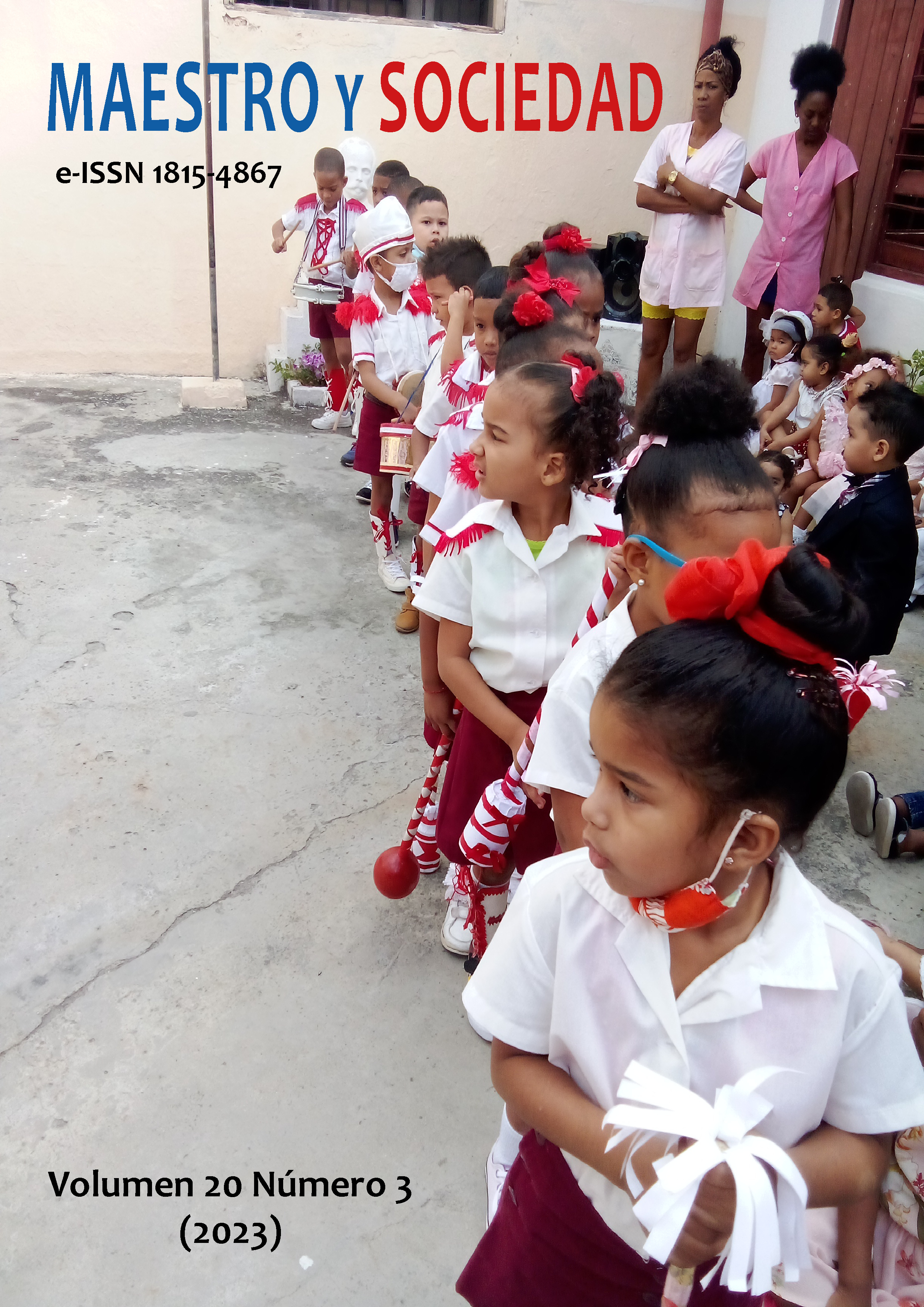Axiological values and their incidence in the teaching-learning process in the students of the "Jorge Carrera Andrade" Basic Education School
Axiological values and their incidence in the teaching-learning process in the students of the "Jorge Carrera Andrade" Basic Education School
Keywords:
Values, axiology, teaching, learning, educationAbstract
Introduction: Axiological values currently call for great social interest in the field of educational levels in the country. The purpose of this development project is to analyze the axiological values and their incidence in the teaching-learning process in order to develop actions that contribute to the improvement of personal self-esteem in the school environment. Materials and methods: The variables of research and scientific articles from different contexts were described theoretically, the principles of axiology were considered, theoretical references based on the formation in values. In addition, the exploratory-descriptive field methodology is used to collect information and proceed when applying a survey to teachers and students and an interview with the manager. Results: The diagnosis of the current situation of the relationship between axiological values and their incidence in the teaching-learning process of seventh grade students, allowed the design of a training plan aimed at teachers with participation in the dynamics of the students of the "Jorge Carrera Andrade" Basic Education School, whose results served to strengthen education in values that will allow the improvement of school coexistence in the classroom and contribute to strengthening respect, love in the educational community and its social environment. . Discussion: Bullying is a behavior that socially affects one or more people who are being victims of the unjustified hatred of the aggressor(s). This type of problem generally occurs in an environment of school and work interaction and is associated with cultural, religious, political, economic and demographic diversity. Conclusions: The evaluation of the teacher training plan allowed to verify the degree of effectiveness and relevance after the process and that the assimilated contents should be considered in the curricular activities in the future and to know the degree of acceptance of the teacher with a very favorable impact on their stake.
References
Alarcón Orozco, E. (2012). Avanzando hacia el desarrollo íntegro de la persona. Dialnet.
Alcalá, N. (sf). Educación en valores. Gobierno de canarias. https://www3.gobiernodecanarias.org/medusa/ecoescuela/proideac/files/2018/04/educacion-en-valores-y-estrategias-def.pdf
Almares Fernández, M., & Pilozo Cedeño, R. (2019). La formación de valores en los estudiantes de Licenciatura en Educación Economía. Antecedentes históricos. https://www.redalyc.org/journal/5891/589162002007/589162002007.pdf
Benitez Zavala, A. (2009). La Educación en valores en el ámbito de la Educación Superior. España: REICE. Revista Iberoamericana sobre calidad, eficacia y cambio en educación. https://doi.org/1696-4713
Benítez, A. (2015). Abandono escolar: modelos que lo explican y programas para atenderlo. Una revisión crítica. https://www.cucs.udg.mx/revistas/edu_desarrollo/anteriores/37/37_Benitez.pdf
Bustamante Alarcón, R. (2018). La idea de persona y dignidad humana. Dykinson. Obtenido de https://www.marcialpons.es/libros/la-idea-de-persona-y-dignidad-humana/9788491488941/
Castaño, E., Terrón, M. J., & Rodríguez, R. (2012). Educación en valores en el ámbito universitario. https://doi.org/978-84-277-1886-9
CCA.ORG. (2021). Algunas estrategias para la educación de valores. CCA.ORG.MX. Obtenido de http://www.cca.org.mx/profesores/cursos/cep21/modulo_8/mainm10_3.htm
Cedeño, J., Herrera, J., Carrión, B., & Murillo, M. (2022). Inclusión social, discriminación e inserción laboral. https://dialnet.unirioja.es/servlet/articulo?codigo=8810159
Cota Olmos, A. (2002). La importancia de los valores en el desarrollo humano de la organización. Universidad Autónoma de Nuevo León.
Flores Carrillo, I. (s.f.). La educación en valores democráticos en los manuales de la asignatura Educación para la Ciudadanía. Revista de educación.
Flores, C. (2020). Abandono y retorno escolar desde la experiencia de jóvenes de educación media superior. https://www.scielo.org.mx/scielo.php?pid=S0185-26982019000300008&script=sci_abstract
Graña, F. (2008). El asalto de las mujeres a las carreras universitarias “masculinas”: cambio y continuidad en la discriminación de género. Praxis educativa. https://cerac.unlpam.edu.ar/index.php/praxis/article/view/462
Humanos, I. I. (2003). Educación en valores éticos. Lima, Perú: Ministerio de Asuntos Exteriores. https://www.iidh.ed.cr/IIDH/media/1915/coleccion-educacion-en-valores-eticos-2003.pdf
Luna, E., & Osuna, C. (2011). Valores Éticos en la Formación Universitaria de las Áreas de Ciencias Naturales e Ingeniería y Tecnología, en el Contexto de la Sociedad del Conocimiento. https://scielo.conicyt.cl/scielo.php?pid=S0718-50062011000500005&script=sci_abstract
Marqués Graells, P. (2001). La enseñanza. Buenas prácticas. La motivación. Departamento de Pedagogía Aplicada.
Marulanda, J., Correa, G., & Mejía, L. F. (2009). Visiones desde las teorias del comportamiento humano. Revista EAN. https://www.redalyc.org/pdf/206/20620269008.pdf
Mayor, S., & Salazar, C. (2019). La violencia intrafamiliar. Un problema de salud actual. Scielo. Obtenido de http://scielo.sld.cu/scielo.php?script=sci_arttext&pid=S1608-89212019000100096
Medina, D. (2007). Estudio de la conceptualización de valor y las estrategias de transmisión. Ciencia y Sociedad.
Montoya Prada, A. (2009). Asalariados de la muerte. Revista Latinoamericana de Seguridad Ciudadana. URVIO. https://doi.org/1390-369
Moreno Jácome, M. (2019). Revisión de educación en valores para el nivel superior en Latinoamérica. Costa Rica: Revista Educación. https://doi.org/0379-7082
Negrete Lares, L. (s.f.). Valores Universales. Nemi. Obtenido de https://www.uv.mx/psicologia/files/2014/11/VALORES-UNIVERSALES.pdf
Núñez Zeas, F. (sf). Educación en valores: Una necesidad educativa. Revista Illari. https://doi.org/http://repositorio.unae.edu.ec/bitstream/56000/379/1/Revista%20Illari%20N%C2%B04%2048-50.pdf
Núñez, P. (2013). La política en la escuela: jóvenes, justicia y derechos en el espacio escolar. Argentina: La Crujía Ediciones. https://doi.org/978-987-601-194-5
Ñacato Ñato, R., & Salas Sandoval, J. (2020). Inteligencia sexual en relación con la autoestima en adultos. Universidad Central del Ecuador. http://www.dspace.uce.edu.ec/handle/25000/22230
Orozco Vargas, J. (2018). El libro de los valores. Bookennials.
Pacheco Prado, L. (2022). Los Valores Humanos. Centro de Publicaciones PUCE. https://edipuce.edu.ec/wp-content/uploads/2022/07/Los-valores-humanos.pdf
Pedreira, A., Cuesta, B., & Bonet de Luna, B. (2011). Acoso escolar. Redalyc. http://biblioteca.clacso.edu.ar/Venezuela/fundavives/20170102055815/pdf_132.pdf
Reyes Prado, A. (sf). ¿Por qué tenemos derechos humanos? RevistaDDHH.
Rodríguez Herrera, A. (2017). Valores: utopía o necesidad para enfermeros. Revista Médica Electrónica. https://revmedicaelectronica.sld.cu/index.php/rme/article/view/1646/html_293
San Román, R., González, I., & Villa, M. S. (2015). Los principios éticos y las obligaciones civiles. ScienceDirect. https://www.sciencedirect.com/science/article/pii/S0041863318300097
Tierno, B. (sf). Valores Humanos. Red escolar. https://redescolar.ilce.edu.mx/sitios/proyectos/bullying_oto21/pdf/valores-humanos.pdf
Unesco. (2019). UNESCO Biblioteca digital. https://unesdoc.unesco.org/ark:/48223/pf0000368961_spa
Unesco. (2021). Educación de valores a través del deporte. Unesco.org.
Vives, J. (2010). Derechos humanos : historia y conceptos básicos. Fundación Juan Vives Suriá. http://biblioteca.clacso.edu.ar/Venezuela/fundavives/20170102055815/pdf_132.pdf
Published
How to Cite
Issue
Section
License
Copyright (c) 2023 Oscar Lenin Briones Cortez, Hamilton Joshue Ballesteros Coello, Edgar Vicente Pastrano Quintana, Limber David Mejia Ortega

This work is licensed under a Creative Commons Attribution-NonCommercial-NoDerivatives 4.0 International License.
This journal provides immediate open access to its content, based on the principle that offering the public free access to research helps a greater global exchange of knowledge. Each author is responsible for the content of each of their articles.



























 Universidad de Oriente
Universidad de Oriente 